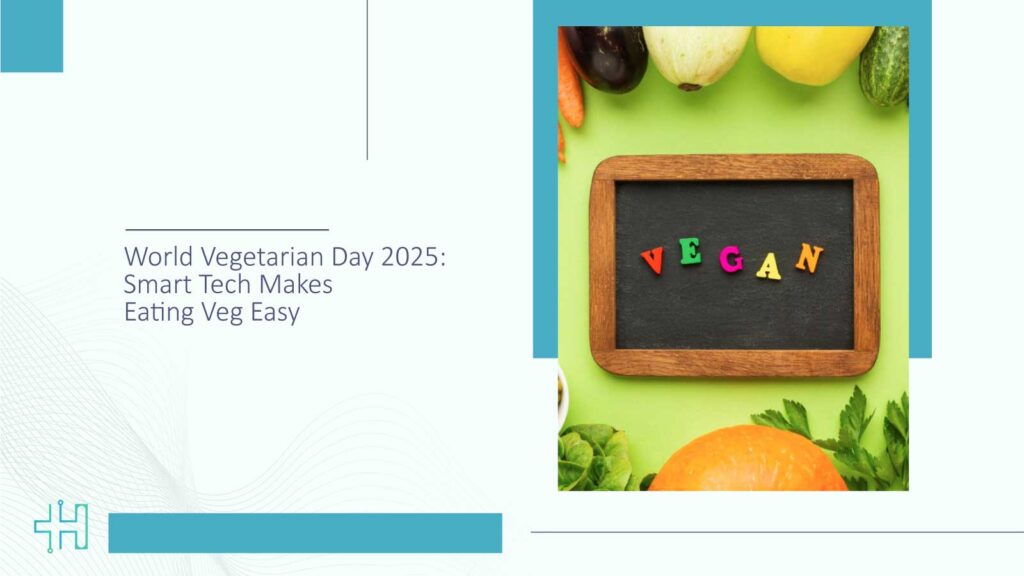Technology and plant-based eating have merged to change our perception of vegetarianism as we celebrate World Vegetarian Day 2025. The vegetarians who had to face the challenge of meal planning, nutritional deficiencies, or limited food choices are no more.
The era of smart technology, from AI-powered meal planners to innovative plant-based food solutions, is making vegetarian diets more accessible, more enjoyable, and more health-oriented than ever before. If you are a vegetarian for a long time, a flexitarian, or someone who is just curious about the reduction of meat consumption, technology is creating a future that will be healthier, more plant-based, and more environmentally friendly than it is now.
The Growing Popularity of Vegetarian Diets
There are more than 1.5 billion people all over the world who consider themselves vegetarians; they make such a choice for their health, ethics, and environmental reasons. However, despite its popularity, it can be quite a challenge to go vegetarian and stay one.
The biggest hindrances to this lifestyle are meal planning, making sure that all nutrients are properly taken, and finding new recipes. Technology is the hero in this situation as it closes the gap and makes vegetarianism more convenient, more pleasurable, and more intelligent.
AI-Powered Personalised Meal Planning
One of the most significant technological changes that has a major influence on a vegetarian diet is meal planning powered by Artificial Intelligence (AI). AI tools come up with personalised, nutritionally balanced meal plans for an individual that include age, activity level, dietary restrictions, and health goals.
Ollie and Eat This Much are just a few of the many applications that are available for users to plan their vegetarian meals for a week with dishes and a grocery list. Some of them even adjust the plans according to the available food, the season of the produce, or the sale in the local stores, thus shortening the food waste and the cost.
A person could put as input that they want high-protein vegetarian meals for the week, and AI could come up with recipes like quinoa-stuffed bell peppers, lentil-based pasta, and tofu stir-fries that not only achieve the protein goal but also do not repeat. Such a personalisation is what makes vegetarianism seem not a “challenge” but a simple daily lifestyle choice.
Smart Kitchen Appliances for the Modern Vegetarian
The presence of technology in our homes has basically changed our lifestyle and cooking habits by introducing numerous kitchen appliances. Devices such as smart air-fryers, pressure cookers, induction cooktops and connected blenders not only can automatically adjust cooking time and temperature but also can provide complete recipes.
Nowadays, a lot of smart appliances are equipped with already installed vegetarian recipes or companion apps that facilitate users step by step. For example:
- On smart pressure cookers, heat and pressure are adjusted automatically for lentils or beans.
- Smart air fryers allow trouble-free frying of vegetables and plant-based snacks at 0 oil.
- Connected induction cooktops sync with apps to keep the temperature at the desired point during the cooking of soups, stews and sauces.
These changes remove all the mistakes one can make in guessing ingredient quantities, temperature of cooking, etc., and as a result, the whole process is done quicker with tastier and more attractive meals for the tech-savvy users who might have chosen processed foods otherwise.
Innovations in Plant-Based Foods
On the other hand, plant-based food innovation is quite similar to the revolution. Some synthetic food technologies like precision fermentation, extrusion cooking and cellular agriculture are the main methods for the development of plant-based meats, cheeses, and dairy alternatives that taste, have the texture, and are of the same colour as animal products.
These innovations draw customers who are not only vegetarians but also flexitarians and meat-eaters who are concerned about their health and the environment, too. For example:
- Cheeses that are produced via lab-grown dairy-free methods imitate conventional cheese when heated and stretched.
- The plant-based strips imitate the texture of chicken, beef, or seafood by incorporating components like pea protein, soy, or mushrooms.
- Production of non-animal eggs has been developed not to differ much in protein composition and cooking characteristics from natural eggs but to lack any animal components.
Research has shown that the rate of adoption of innovations in plant-based foods will be as high as 12.9% in the period from 2025 to 2034 (FPPN). Such innovations make people switch to vegetarianism more easily and without feeling limited, which in turn leads to greater adoption rates and satisfaction with the diet.
Tracking Nutritional Health with Wearables and Apps
One aspect of smart technology is also the inclusion of wearables and apps that continually monitor health metrics and dietary intake. Smart watches are a few gadgets that, when connected with various meal-tracking apps, can keep track of calories, macronutrients, and even micronutrients.
Certain advanced apps enable users to scan their meals and, immediately, provide the content of protein, iron, vitamins, and calories, making sure that the vegetarian diet follows daily nutritional standards. Such a meticulous level of monitoring not only assists with the prevention of nutrition deficiency in vegetarian diets, such as Vitamin B12 or iron, but also provides simple pieces of advice for weight management or fitness goals.
Combining AI-driven meal planning, smart appliances and wearable, a vegetarian can go a step further in the completion of an integrated nutrition plan supported by data, thus cutting down on the speculation and increasing reliance on a balanced diet.
Environmental Benefits Amplified with the Help of Technology
A switch to vegetarianism could really start to reflect numerous environmental perks. The research shows that changing to a plant-based diet can cut greenhouse gas emissions by 35%, land use by 42%, and freshwater use by 55%.
Some of the practical ways that smart technology can bring these environmental benefits to a higher level are the introduction of AI-powered meal planning and smart energy consumption devices.
- AI-powered meal planning is integrated to ease grocery shopping and reduce food waste.
- While preparing plant-based meals, the consumer may utilise various home energy usage tracking and management devices.
- Consumers are linked with local farmers or suppliers of vegan products through technology, allowing them to verify that sustainability standards are met.
Consequently, the advantage of technology is that it can make plant-based eating convenient and, at the same time, more environmentally friendly.
Regional Trends and Technology Adaptation
Vegetarian diets vary from one culture to another. Lentils, paneer, and vegetables are staples of vegetarian diets, whereas in the West, plant-based meat alternatives are becoming more popular.
Proof that smart tech is attuned to local requirements includes:
- Providing culturally familiar recipes.
- Employing AI to recommend product substitutes for ingredients that are locally not available.
- Getting the traditional methods of cooking into a tech-friendly format.
For instance, a meal planner using AI in India would come with the suggestion of millet-based dosa accompanied by protein-rich fillings, while an app in the U.S. would offer lentil burgers with plant-based cheese, thus ensuring that vegetarian diets remain engaging irrespective of the place.
Overcoming Challenges
Though technology greatly facilitates vegetarianism, the latter still faces some challenges:
- Digital divide: Not everyone has access to smart devices or high-speed internet.
- Data privacy: Health and dietary data need secure handling.
- Cultural adaptation: Over-reliance on tech could overshadow traditional cooking practices.
Coping with such issues will require us to strike a delicate balance between embracing innovation and preserving accessibility and culinary heritage.
The Future of Smart Vegetarian Eating
On World Vegetarian Day 2025, the reality of smart technology is conveyed in no uncertain terms to be redefining the vegetarian experience. Technology is the game changer; from AI meal planners to smart home appliances and plant-based foods, which are not only encouraging but also eco-friendly.
Through the use of these tools, one can enjoy a diet that is the best both for the environment and one’s health without giving up on the good taste or convenience of the meals.
Actually, the future of the vegetarian diet will not only depend on the food itself but also on how it is prepared, monitored and enjoyed, where smart tech will be playing the role of a trusted partner. As we commemorate today, let’s move forward with technology to make plant-based living not only more convenient but also more rewarding.
FAQs
1. What is World Vegetarian Day 2025?
World Vegetarian Day is a day to promote the various health, environmental and ethical benefits of the vegetarian diet, which is celebrated every year on 1 October. In 2025, the event will promote the innovation that is the transition to a plant-based diet, which is less complicated than before.
2. How is technology making the vegetarian diet more convenient?
Technological advancements such as AI-powered meal planners, smart kitchen appliances, nutrition-tracking apps, and plant-based food products have been made to simplify vegetarian meals. The major applications of these tools are meal planning, nutrition monitoring, and food waste reduction.
3. What are some popular apps for vegetarian meal planning?
The public apps are Maple and Ollie, which both offer features such as personalised meal plans, grocery lists, and recipe suggestions that are mostly dependent on dietary preferences and nutritional needs.
4. Can AI be used to ensure that the vegetarian diet is balanced?
For sure. AI meal planners are able to assess the amount of protein, vitamins, and minerals in food products and, accordingly, come up with balanced vegetarian meals; thus, they provide a step-by-step guide to meeting daily dietary requirements.
5. How do smart appliances help vegetarians?
Smart appliances like air fryers, pressure cookers, or connected cooktops can make the process of setting the exact time, temperature, and recipe requirements for cooking, and thus, it is very convenient to prepare your meal healthily.
Dive deeper into the future of healthcare.
Keep reading on Health Technology Insights.
To participate in our interviews, please write to our HealthTech Media Room at sudipto@intentamplify.com



